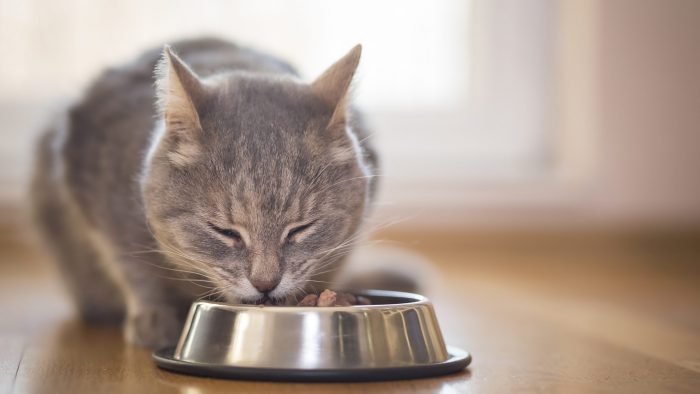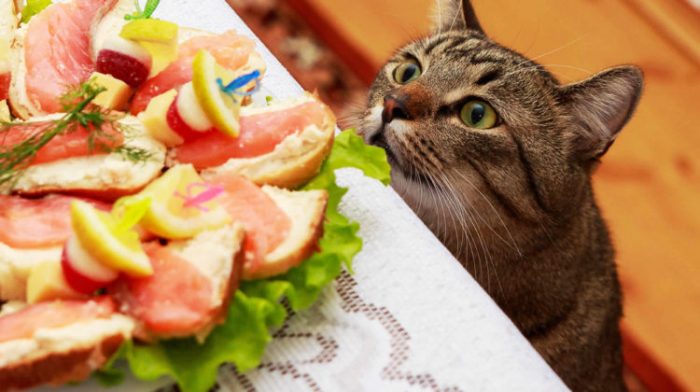Many of us love the purring sound our cats make when we are petting them and would go to any length to make them comfortable and healthy – just like any member of our family. Kind gestures extended to your furry friend might include table scraps which you need to know more about. Your cat’s nutrition is very important for its total well being, and it is equally important to know both what to feed your pet and what not to. To shed more light on this and save your cat from allergies, we will be looking at those human foods cats shouldn’t eat in this piece.
Table of Contents
These 10 Human Foods Cats Shouldn’t Eat Can Harm Your Pet
As aforementioned, some human foods can spell doom for cats and if you are a cat lover, you need to get acquainted with them. Let’s look at 10 human foods that may be fatal if given to your cat, they include:
1. Dairy Products, Including Milk
This may seem like a mistake as we seem to have formed this image in our minds that cats always drink milk; the problem is that while almost all cats can tolerate their mother’s milk as kittens, some cats can’t tolerate lactose in milk as adults, as it causes digestive problems in them.
If your cat can tolerate lactose as an adult, then it is fine to keep feeding it, but if it can’t digest it, you should stop feeding it milk. In other words, some cats can tolerate milk while some others can’t process it when ingested into their body. This may sound similar to lactose intolerance in humans but the effect is more serious in cats. So, the next time you feel like giving a treat to your fur baby, keep in mind that milk is on the list of human foods cats shouldn’t eat.
2. Liver
Feeding your cat with liver – either raw or processed, on a non-regular basis is fine, but if you make this a daily staple meal, then it can lead to problems for your cat.
Definitely among human foods cats shouldn’t eat, consuming liver in excess will lead to Vitamin A toxicity, which would manifest as bones deformity in your cat – especially at the joints. If you don’t want a cat with bone and joint issues, limit the number of liver chumps you give it.
3. Tuna Fish
Many cat owners may intend to feed their feline companions with tuna – especially those meant for human consumption, almost on a daily basis, but this could prove fatal for your pet.
Problem is, feeding your cat tuna on a daily basis – especially if fed alone, would lead to malnutrition as it doesn’t contain all the nourishment needed for all-round development for your cat and mercury poisoning may also occur. Occasional feeding is okay though, combined with other foods.
4. Raw Eggs
Some say you can never go wrong with eggs but that doesn’t include when you serve them raw to your cat. Feeding your cat with raw eggs may introduce Salmonella and Ecoli bacteria into their digestive systems and eventually their bloodstream, which could prove fatal. Raw eggs also contain an enzyme that causes coat and skin problems in cats. Common symptoms could include bloody diarrhea, lethargy, and/or vomiting.
So, yeah, eggs are great but they have somehow made the list of human foods cats shouldn’t eat because they cause more harm than good if eaten raw.
Read Also: Cat Swollen Lip: Meaning And Possible Remedy
5. Raw Meat and Bones
Feeding your cat raw bones can damage its teeth and splinters of bones ingested can cause rupture or other damage in its intestines. Raw meat may contain parasites like tapeworm and toxoplasma, as well as E. coli and Salmonella bacteria, which are harmful to your pet; if you choose to feed your cat with meat, make sure to cook it properly.
This apparently applies to humans as well. Eating raw meat can introduce unwanted bacteria and parasites that would attack the body at any given opportunity.
6. Raw Dough
If you are a baker or love baking, and you own a cat, please resist the urge/tendency to toss some dough to your cat. The reason is that dough contains yeast, and when ingested, it can cause the stomach of your cat to swell and cause an obstruction so severe it might require immediate surgery.
7. Garlic And Onions
Garlic, onions, and other bulbs contain Thiosulphate, a chemical that is toxic to cats if consumed in large amounts. Thiosulphate over-consumption by cats can lead to Hemolytic Anemia – the destruction of the red blood cells of your cat. In all, onions and garlic cloves are among human foods cats shouldn’t eat but they can still consume them in moderation.
8. Chocolates
If you love chocolates and eat them a lot around your cat, chances are that you may unintentionally decide to toss a few for the furball to munch on from time to time, but please don’t.
Chocolates contain Methylxanthines which are toxic to cats. It can cause abnormal heart rhythms, muscle tremors, diarrhea, vomiting, and seizures. Avoid feeding this as a treat to your cat – including dark chocolates.
9. Currants, Raisins, and Grapes
These sumptuous fruits are known to cause kidney failures in some dogs, but there is no definite report yet that says the same applies to cats. It is, however, safe to lean on the side of caution and not feed these fruits – particularly their seeds and pits, to your cat.
10. Dog Food
Not just human foods, there are dog foods you shouldn’t feed your cat as well. Perhaps you own both a dog and a cat, please try not to make the dog’s food a regular meal for your cat. While it’s not such a terrible idea to feed your cat with the dog’s food once in a while, just make sure it doesn’t replace the cat’s specially formulated food.
Read Also: The Worst & Best Hamster Foods: These Foods Can Kill A Hamster

What To Do If Your Cat Consumes Toxic Food
No matter how careful you are with your cat, it is possible that it may still get to eat something that it’s not meant to, so, if you notice any form of lethargy, vomiting, or any other sign your cat is feeling unwell, the best thing to do is to call your vet or the nearest Animal Poison Control Center.
Listen carefully to the advice of the professionals on how to remedy your pet’s condition, and if need be you can rush it to the vet as soon as possible. Most times, the effect of allergic reactions requires immediate attention.
